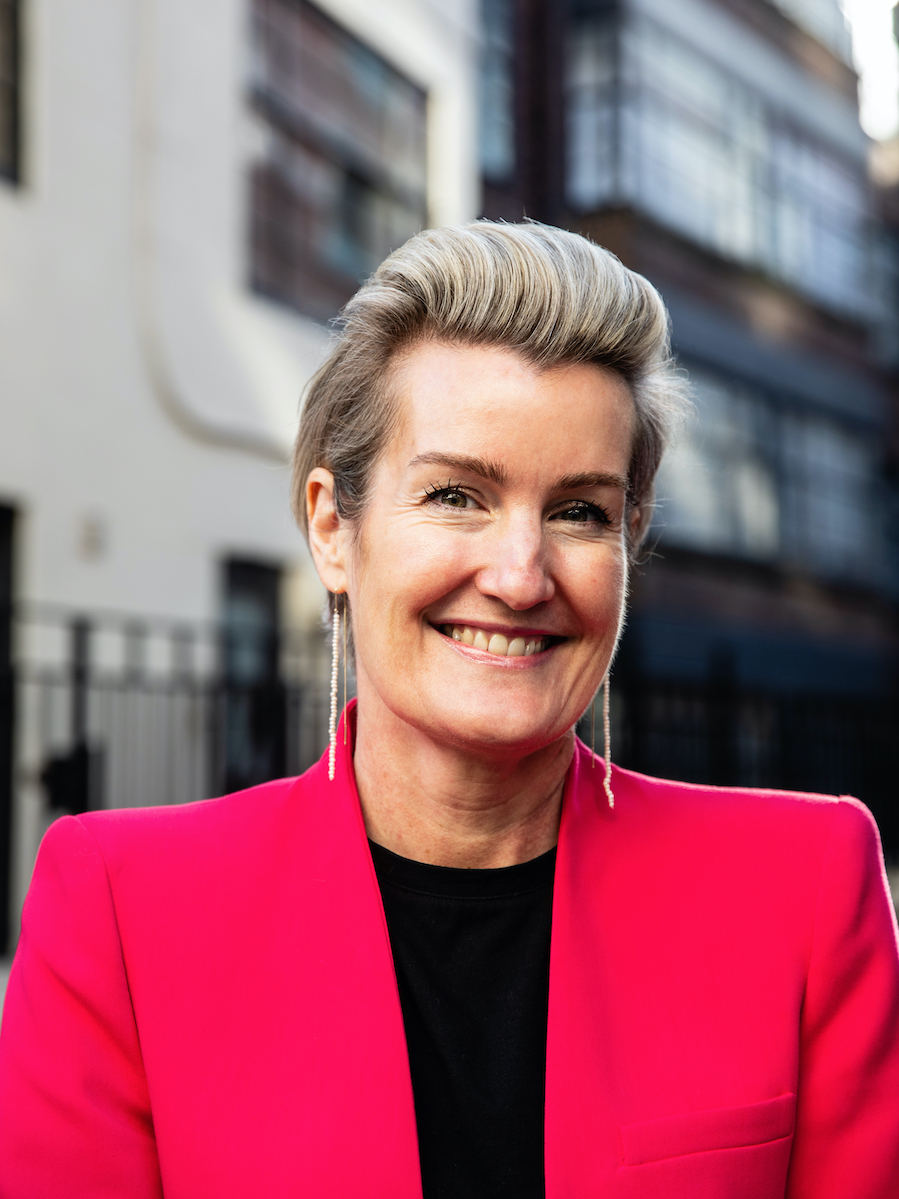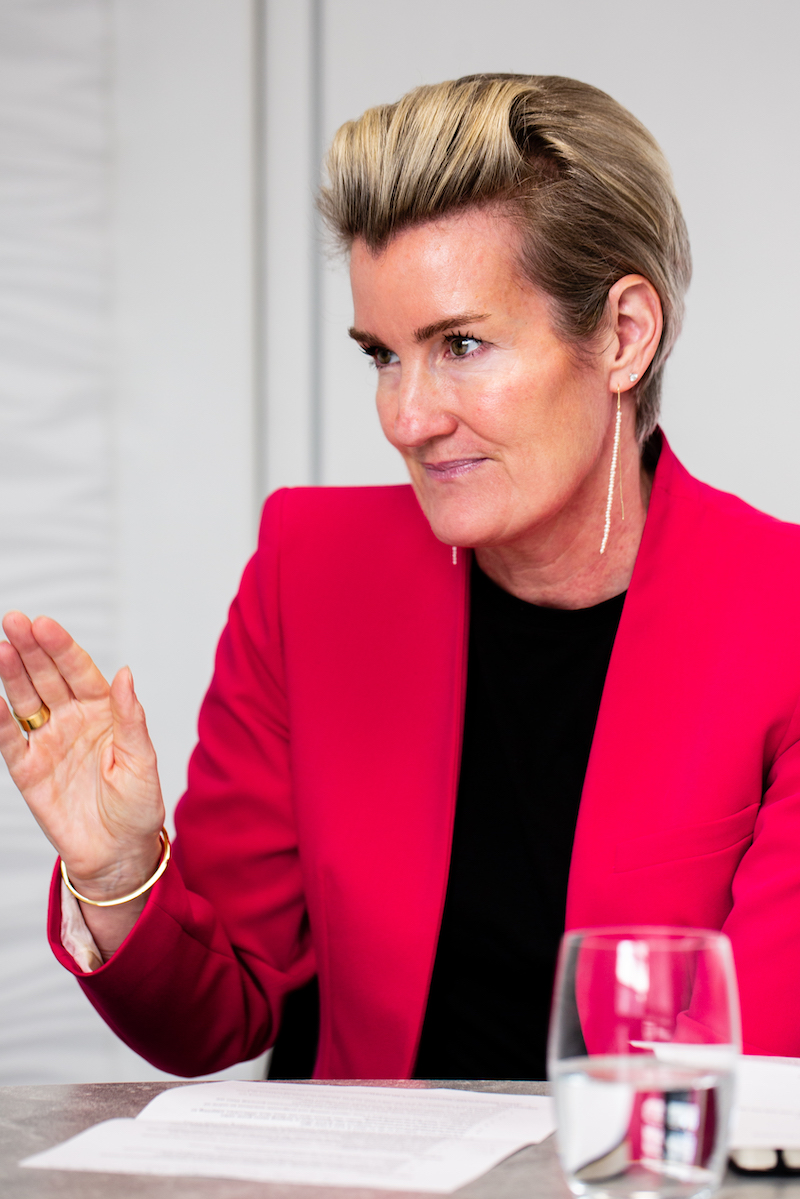What business rates: Interview with BCC boss Shevaun Haviland
BCC director general Shevaun Haviland, photographed for The House by Louise Haywood-Schiefer
9 min read
Business leaders and ministers are at odds over issues ranging from migration and Brexit to planning and tax. Shevaun Haviland, director general of the British Chambers of Commerce, tells Tali Fraser she is braced for a tough year. Photography by Louise Haywood-Schiefer
Shevaun Haviland doesn’t sugar-coat the damage the last few years have done to the United Kingdom’s reputation for sober moderation. “People do look at what has happened here over the last few years and say: ‘That’s not like you. What’s going on?’ So, we need to just get back to a bit of that long-term clarity and stability.”
The 51-year-old, who lists Walt Disney and the Cabinet Office on her CV, has the job of telling her old colleagues in government some home truths – and then telling them again.
In just two and a half years of being director general of the British Chambers of Commerce (BCC) – representing 70,000 businesses and covering six million employees – she has experienced working alongside three prime ministers, four chancellors and a further four business secretaries.
It’s not as if anyone is doing well out of the churn. This year’s growth is still forecast at one per cent, “so very much flat”, Haviland says. Add to that the political noise that goes with an election.
“It is going to be a tough year,” she says.
Haviland – the first in her family to go to university, studying philosophy, politics and economics at Oxford – is well-practised in dealing with politicians and the Westminster machinery, as well as business types.
Government often feels like it’s 10 years behind what’s happening in the real world
After a career in consultancy and then that stint at Disney, where she oversaw the opening of one of the company’s theme parks in France, she was poached by the UK government.
She worked in the Cabinet Office as the deputy director of business partnerships to develop social policy change alongside big business, followed by a stint running Theresa May’s business relations team in No 10, during which time she admits that Brexit became a strain.
One constant during her Whitehall career has been the churn of ministers through government departments. For example, Haviland has worked alongside six Treasury chief secretaries in her short time as director general.
“I’m going to be honest with you,” she says, “it is challenging every time there is a reshuffle and it means we are rebriefing ministers on these issues each time.”
She adds: “The businesses of the UK tell me it is challenging… When you have to start a new brief as a minister, over and over, of course it takes time to get up to speed and, again, it goes back to our need for consistency.
“Government often feels like it’s 10 years behind what’s happening in the real world,” Haviland says.
In the real world, she says, businesses are struggling to handle post-Brexit trade.
“We knew [Brexit] would be challenging,” Haviland says, “and it was challenging at the beginning – we thought it would sort of get easier but, frankly, it hasn’t.”
 BCC boss Shevaun Haviland, photographed by Louise Haywood-Schiefer in Westminster
BCC boss Shevaun Haviland, photographed by Louise Haywood-Schiefer in Westminster
There remains “an incredible amount of paperwork” to complete for businesses exporting food and drink products.
One business affiliated with the BCC stopped exporting hampers last Christmas as they were having to fill in a different piece of paperwork for every item of food and drink included. If a single form contained an error, the hamper would get sent back: “That was 20 per cent of their business gone. But it just wasn’t worth it,” Haviland says.
“We would like to see more done on trade and export support services. Getting more businesses trading around the world is a quick and huge return on investment; so put some money, government, into helping businesses export.”
With those issues, can it really be said that Brexit Britain is working for businesses?
“I guess that depends on what angle you’re looking at,” Haviland responds. “If you’re a trader, it’s been very hard.”
Hospitality and the hotel industry are suffering, too: “They will tell you that they knew who was on their front desk before Brexit – but they went home. Everybody in the UK has stories of hotels closing floors, or restaurants only opening four nights a week… because of that staffing issue.”
On a visit to the Northamptonshire town of Wellingborough, Haviland met a local councillor and restaurant owner who was struggling to keep his business open: “He just said that it is so tough running a restaurant. They feel like they’re on a knife-edge all the time. They don’t have any reserves.”
Inflation has now been flagged as the number one concern for BCC businesses for 10 quarters in a row, having not made the top spot for 30 years previously.
“Interest rates have been coming up quickly behind them so the sooner we can see inflation keep going down and interest rates begin to come down – we recognise that is a fine balance for the governor [of the Bank of England, Andrew Bailey] – that will give just a bit of breathing space for business,” Haviland says. She meets Bailey ever quarter.
Inflation was already forecast to halve in 2023, so is it right for the Prime Minister to try to claim “we’ve halved inflation” as a personal victory?
“I think there are a number of things at play,” the BCC director general says. “I think bringing in Jeremy [Hunt], who kept within the guardrails and was relatively cautious, that’s certainly helped. Then, of course, the things that drove inflation – the Ukrainian war, global energy issues – dissipated, which also helped.”
Comparatively, Haviland admits, the UK “was never going to be able to compete” with the European Union or the United States on inflation reduction. Instead, she thinks the nation should be “playing into our strength for agility” to show investors the UK can adapt quickly to global geopolitics.
One of the BCC director general’s biggest policy gripes is with business rates; something she believes “needs full reform”, allowing new companies to establish themselves before being hit with huge tax bills, potentially with a new sliding scale of rates.
Although Haviland is resigned to the fact that it will not come before the election, she thinks it should be a priority for the next government: “The reason that they haven’t done business rates so far is because it’s hard; it’s hard. We had a great chocolate company only doing online sales, and she wanted to open a shop on the high street. It was going to cost her £10,000 in business rates before she’d even sold a single bar of chocolate, so she decided against it.”
 BCC boss Shevaun Haviland during her interview with The House
BCC boss Shevaun Haviland during her interview with The House
The BCC’s national business council – established in the wake of allegations of sexual misconduct at their most prominent peer, the Confederation of British Industry (CBI) – comprises “20 or so” FTSE businesses and boasts regular contact with ministers. One of the council’s biggest successes was the Chancellor’s decision to allow permanent, full expensing of capital investment, the fruits of a sustained lobbying effort.
In one of the BCC’s first FTSE business council meetings, Michael Gove attended and was confronted by a frustrated CEO about business rates and planning reform.
“A member of ours said: ‘We want to invest billions, Michael, but we can’t get out the door because we can’t get planning for it.’”
In a later discussion with the Chancellor ahead of the Autumn Statement, Haviland says Hunt asked her: “Would businesses pay if the planning process was quicker and more transparent?”
The BCC director general’s immediate answer was: “Yes! The delays mean they are effectively already paying so they would rather have an answer.”
Plans for the introduction of new premium planning services across England were later unveiled by the Chancellor, whereby councils will be able to offer “guaranteed accelerated decision dates” for major developments in England in exchange for a fee. Refunds will be issued if the deadline is not met.
With no legislation on the issue yet to emerge, however, one business owner has expressed their worries to Haviland that “they will just speed up the decisions that are a ‘no’”.
Jeremy likes to say to me, ‘Shevaun, we have a very tight fiscal envelope
Travelling up and down the country to speak to the 53 regional chambers of commerce the BCC represents, Haviland says that staffing and the skills shortage is a key concern “common across all businesses”.
Is the migration system set up in a way that works for businesses and deals with these staffing shortages?
“No, not really at the moment,” the BCC director general answers, urging the government to “review the immigration system” as soon as possible and “answer the question of how we can use our migration system to help build our economy”.
Haviland says she is regularly telling the Treasury that the context to the nation’s wider economic woes is a “lack of investment, tight labour market and, of course, continuing challenges trading with our largest trading partner, the EU”.
But the Chancellor continues to repeat the same message to the BCC’s director general: “Jeremy likes to say to me, ‘Shevaun, we have a very tight fiscal envelope.’”
Haviland adds: “I absolutely understand that having gone through Covid, with a huge drain on public resources… we need to find ways of getting back to economic growth.”
She spent the pandemic driving from her family home in Chiswick to her job at the Cabinet Office – a 15-minute journey that felt like a disaster movie.
It was there that she saw directly how the government moved to protect businesses with policies like furlough, a goal she wants to continue working towards today.
A ‘day-one playbook’ for the next government is being developed by the BCC that will set out the top five things to do “straight out of the gate” to help businesses, with a focus on areas including green innovation, people and staffing, the digital revolution, local economies, and global Britain.
The UK has a strong business ethos, Haviland maintains – and, she says, “the rest of the world does still want to come here”.
